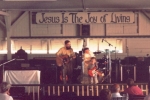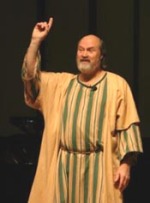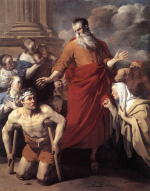The 21st Century Retooling of the Church – Part V
 In the past we have thought of an evangelist as a profession, someone academically trained at a Bible College or Seminary who now does “evangelism” for a living. This immediately puts pressure on the person and the church to “provide” financially for their needs. That is why there is always an offering at evangelistic meetings. A nonchristian often looks at this as a pay for performance tactic, and the media has always questioned the validity of money with ministry.
In the past we have thought of an evangelist as a profession, someone academically trained at a Bible College or Seminary who now does “evangelism” for a living. This immediately puts pressure on the person and the church to “provide” financially for their needs. That is why there is always an offering at evangelistic meetings. A nonchristian often looks at this as a pay for performance tactic, and the media has always questioned the validity of money with ministry.
The Church needs to rethink, or retool its thinking, on what is an evangelist. An evangelist has a spiritual calling, a spiritual gift, a passion to win the lost, a drive to help the lost find their way into the kingdom of God, a point of view skewed by this drive and passion to see the overwhelming need to save that which is lost. The evangelist sees the fires of hell, the insane distance between fallen man and his God, the anguish of not personally knowing God, and the dread of knowing that anguish and torment is eternal unless the “good news of Jesus Christ”, the gospel, is preached to all in that state, to save them from their eternal damnation and separation from God into a personal relationship, fulfillment, and intimate union with God whom they had been separated from through the Cross and Resurrection of Jesus Christ.
We have to “retool” our mindset that an evangelist has to be a professional. No, he is any believer in Jesus Christ who is driven by this passion to save the lost by birthing them into the Kingdom of God through Jesus Christ. That is the way an evangelist thinks. That is his point of view. He sees only the lost and their birth. After their birth he is driven to win more to Christ, not necessarily nurture them in their new walk and life in Christ, that is why he needs the other four passions and points of view of the five fold around him. A true evangelist is driven by this point of view no matter if he is pain or not. Let’s take finances out of the equation right now to understand the true nature of an evangelist. Money is not the issue, passion, drive, point of view, and calling is!
 We all have an evangelistic spirit within us, and need to share the gospel with the lost. One-on-one evangelism is still the most effective means of winning the lost. We must also recognize that in the Body of Christ there are believers who are “driven” by a “passion” because of the way they see the world through their spiritual eyes, their point of view. Often believers with this passion receive opposition from the very church that should be supporting them, developing them, nurturing their calling, and “equipping them for the work of the service”. What is your local church doing to “equip” those who recognize this drive and passion within themselves? Better yet, what are you doing as a supporting member in the Body of Christ to help “equip” those who recognize their drive and passion? That is the retooling we need to look at and perform.
We all have an evangelistic spirit within us, and need to share the gospel with the lost. One-on-one evangelism is still the most effective means of winning the lost. We must also recognize that in the Body of Christ there are believers who are “driven” by a “passion” because of the way they see the world through their spiritual eyes, their point of view. Often believers with this passion receive opposition from the very church that should be supporting them, developing them, nurturing their calling, and “equipping them for the work of the service”. What is your local church doing to “equip” those who recognize this drive and passion within themselves? Better yet, what are you doing as a supporting member in the Body of Christ to help “equip” those who recognize their drive and passion? That is the retooling we need to look at and perform.

















































